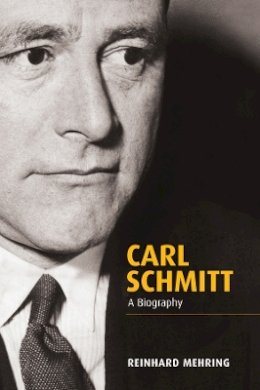
Carl Schmitt: A Biography
Reinhard Mehring
Carl Schmitt is one of the most widely read and influential German thinkers of the twentieth century. His fundamental works on friend and enemy, legality and legitimacy, dictatorship, political theology and the concept of the political are read today with great interest by everyone from conservative Catholic theologians to radical political thinkers on the left.
In his private life, however, Schmitt was haunted by the demons of his wild anti-Semitism, his self-destructive and compulsive sexuality and his deep-seated resentment against the complacency of bourgeois life. As a young man from a modest background, full of social envy, he succeeded in making his way to the top of the academic world in Germany, and yet he never felt at home in the academic establishment and among those of high social standing. When the Nazis seized power, Schmitt was susceptible to their ideology. He broke with his Jewish friends, joined the Nazi Party in May 1933 and lent a helping hand to Hitler, thereby becoming deeply entangled with the regime. Schmitt was irrevocably compromised by his role as the 'crown jurist' of the Third Reich. After the war, he led a secluded life in his home town in the Sauerland and became a key background figure in the intellectual scene of postwar Germany.
Reinhard Mehring's outstanding biography is the most comprehensive work available on the life and work of Carl Schmitt. Based on thorough research and using new sources that were previously unavailable, Mehring portrays Schmitt as a Shakespearean figure at the centre of the German catastrophe.
Product Details
About Reinhard Mehring
Reviews for Carl Schmitt: A Biography
often referred to as the Hobbes of the 20th century. Especially revealing are his struggles to shatter “the Jew in him,” which led him to aspire to become Hitler’s “pope” with all that that implied. Politically naïve about Nazism, he was severely attacked by the SS in 1936 and marginalized for, among other reasons, his pre-1933 close association with Jews and his anti-Nazism." George Schwab, President, National Committee on American Foreign Policy ‘Mehring’s book is a remarkable achievement: an intellectual biography that illuminates a whole era while taking very seriously the intimate connections between the theory and the restless and obsessive personality of its main character. It is bound to remain a fundamental reference in the vast literature on one of the most decisive chapters in European constitutional history: the Weimar Republic.’ Political Studies Review ‘By presenting a complete account of Schmitt’s life, heretofore absent, Mehring has done a great service. This biography will no doubt be the point of departure for studies of Carl Schmitt and his intellectual legacy for a long time.’ Constellations
